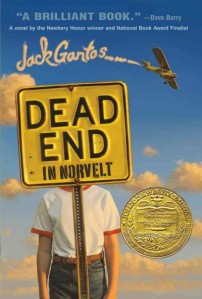 Bibliographic Info:
Bibliographic Info:
Gantos, Jack. 2011. Dead End in Norvelt. New York: Farrar Straus Giroux. ISBN 9780374379933.
Review:
It’s the summer of 1962 and Jack Gantos is completely and utterly grounded. In his 2012 Newbery award-winning novel, Dead End in Norvelt, Gantos writes about himself and his real hometown during one very interesting and often bizarre summer. Recruited by elderly neighbor Miss Volker as her right-hand man, Jack learns to construct fantastically over-written yet historically important obituaries. He also helps his father dig a hole for a fake (or is it?) bomb shelter, narrowly avoids the wrath of a group of Hell’s Angels, and valiantly tries to become un-grounded, all while plagued by nosebleeds that occur at the most inopportune times.
Writer Gantos’s style is zany and the text is cleverly filled with historical facts that often lead to hilarious segues in main character Jack’s thoughts and actions. Despite the many historical references that have the potential to bog down the story, the action rapidly moves forward and propels the story into further strange and delightful directions. In one scene, Miss Volker suspects an olderly neighbor has died and quickly prompts Jack to look in on the neighbor. She tells Jack to wear a disguise, but the only one he has is a Grim Reaper costume from Halloween. In response, Miss Volker cackles and says, “‘Mrs Dubicki’s going to have to see the Grim Reaper sooner or later, so it might as well be sooner” (Gantos 2011). Miss Volker is a sharp-tongued woman with a brain like a sponge when it comes to history. She teaches Jack about the founding of Norvelt and, through the writing of the obituaries, that it is important to remember and understand history so that mistakes won’t be repeated. “Each quirky obituary is infused with a bit of Norvelt’s history, providing insightful postwar facts focusing on Eleanor Roosevelt’s role in founding the town on principles of sustainable farming and land ownership for the poor” (Reutter 2011).
However off-the-wall many of the events in Dead End in Norvelt appear, Gantos shares an important message with his readers; it is not only important to remember the past so that mistakes are not repeated, but understanding the past also helps you understand yourself and the world around you. This is demonstrated each time Miss Volker, Mr. Gantos, and Mrs. Gantos each voice their respective opinions about a topic. Gantos writes in a way that the reader can understand and sympathize with each individual’s point of view despite the differences of opinion they each have.
Dead End in Norvelt is great for children ages 10 and up. Considering main character Jack’s wacky adventures, this novel would be great fun to read aloud with a classroom or a book club. Encourage students or book club members to research and share an interesting piece of local history. The wackier, the better.
References:
Reutter, Vicki. September 2011. School Library Journal. http://ezproxy.twu.edu:2125/DetailedView.aspx?hreciid=|33895753|33027420&mc=USA#. Accessed November 6, 2013.